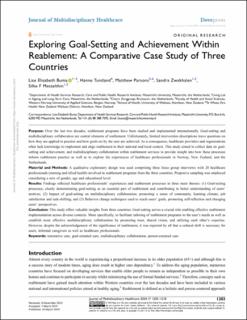| dc.description.abstract | Purpose: Over the last two decades, reablement programs have been studied and implemented internationally. Goal-setting and multidisciplinary collaboration are central elements of reablement. Unfortunately, limited intervention descriptions leave questions on how they are applied in practice and how goals set by the user are achieved. As a consequence, healthcare providers and organizations often lack knowledge to implement and align reablement to their national and local context. This study aimed to collect data on goal-setting and achievement, and multidisciplinary collaboration within reablement services to provide insight into how these processes inform reablement practice as well as to explore the experiences of healthcare professionals in Norway, New Zealand, and the Netherlands.
Material and Methods: A qualitative exploratory design was used comprising three focus group interviews with 20 healthcare professionals (nursing and allied health) involved in reablement programs from the three countries. Purposive sampling was employed considering a mix of gender, age and educational level.
Results: Findings reflected healthcare professionals’ experiences and reablement processes in three main themes: (1) Goal-setting processes; clearly demonstrating goal-setting as an essential part of reablement and contributing to better understanding of users’ motives; (2) Impact of goal-setting on multidisciplinary collaboration; promoting a sense of community, learning climate, job satisfaction and task-shifting; and (3) Behavior change techniques used to reach users’ goals, promoting self-reflection and changing users’ perspectives.
Conclusion: This study offers valuable insights from three countries. Goal-setting serves a crucial role enabling effective reablement implementation across diverse contexts. More specifically, to facilitate tailoring of reablement programs to the user’s needs as well as establish more effective multidisciplinary collaboration by promoting trust, shared vision, and utilizing each other’s expertise. However, despite the acknowledgement of the significance of reablement, it was reported by all that a cultural shift is necessary for users, informal caregivers as well as healthcare professionals.
Keywords: restorative care, goal-oriented care, multidisciplinary collaboration, person-centered care | en_US |

